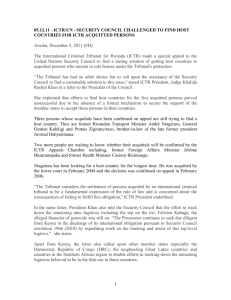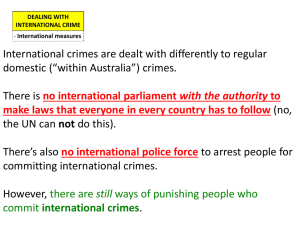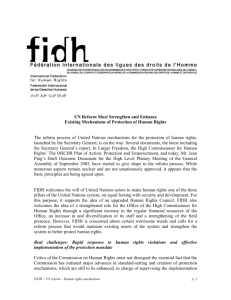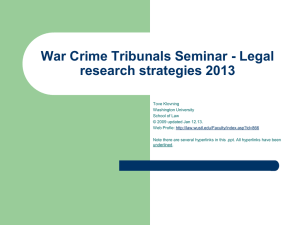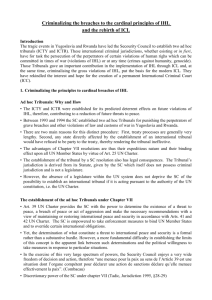the issues at stake in the closure of the international
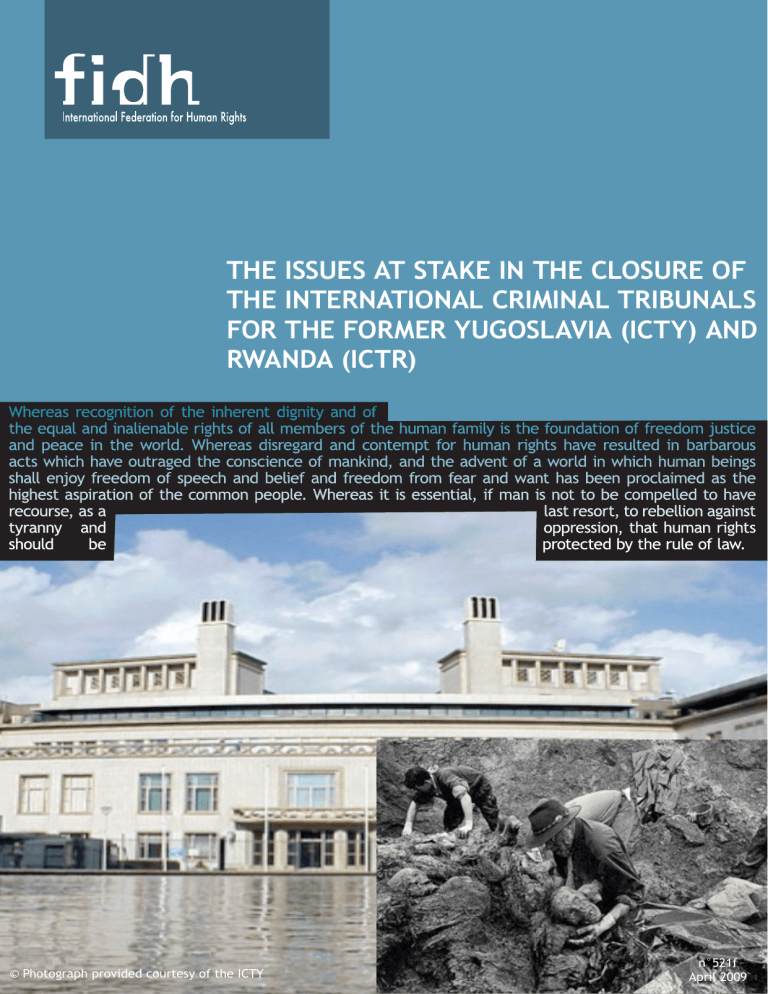
THE ISSUES AT STAKE IN THE CLOSURE OF
THE INTERNATIONAL CRIMINAL TRIBUNALS
FOR THE FORMER YUGOSLAVIA (ICTY) AND
RWANDA (ICTR)
Whereas recognition of the inherent dignity and of the equal and inalienable rights of all members of the human family is the foundation of freedom justice and peace in the world. Whereas disregard and contempt for human rights have resulted in barbarous acts which have outraged the conscience of mankind, and the advent of a world in which human beings shall enjoy freedom of speech and belief and freedom from fear and want has been proclaimed as the highest aspiration of the common people. Whereas it is essential, if man is not to be compelled to have recourse, as a tyranny and should be last resort, to rebellion against oppression, that human rights protected by the rule of law.
© Photograph provided courtesy of the ICTY n°521f
April 2009
FIDH - THE ISSUES AT STAKE IN THE CLOSURE OF THE INTERNATIONAL CRIMINAL TRIBUNALS FOR THE FORMER YUGOSLAVIA (ICTY) AND RWANDA (ICTR)/3
Table of Contents
Introduction 4
1) Adapt the 2010 deadline to permit the ad hoc Tribunals to effectively fulfil their mandate 5
2) Resources to be provided for effective implementation of a work completion strategy 6
8 3) Fugitives not to be allowed to escape international justice
4) Work to be carried out, without reservations, to have the facts established and acknowledged
5) A proper transition of assistance to national judicial systems
6) Victims to be put at the centre of the completion strategy
9
10
11
7) Security and accessibility of archives to be guaranteed 12
FIDH - THE ISSUES AT STAKE IN THE CLOSURE OF THE INTERNATIONAL CRIMINAL TRIBUNALS FOR THE FORMER YUGOSLAVIA (ICTY) AND RWANDA (ICTR)/3
Introduction
At the beginning of the 1990s, the UN Security Council decided to create the ad hoc International
Criminal Tribunals (the Tribunals or ICTs) in response to the atrocities committed during the conflicts in the former Yugoslavia and in Rwanda. The juridiction of these two ad hoc tribunals is restricted to crimes committed in a particular region and for a specific conflict.
The International Criminal Tribunal for the former Yugoslavia (ICTY) was established under
Security Council Resolution 827 (May 25, 1993), in order to try individuals allegedly responsible for war crimes, crimes against humanity and genocide in the former Yugoslavia since 1991. Its seat is in the Netherlands, in The Hague.
Eighteen months later, following the adoption of Resolution 955 (November 8, 1994), the Security
Council established the International Criminal Tribunal for Rwanda (ICTR), to try individuals allegedly responsible for genocide, crimes against humanity and war crimes committed in Rwanda or by Rwandan citizens in the territory of neighbouring States between January 1 and December 31,
1994. The Tribunal Trial Chambers are located in Arusha, in Tanzania, and the Appeals Chambers are in The Hague.
The Tribunals have accomplished extremely important work in the fight against impunity for the most serious crimes committed during the conflict in the former Yugoslavia and during the Tutsi genocide in Rwanda.
As of today, the ICTY has indicted 161 persons; 44 persons are accused in 19 on-going cases; 2 accused are at large; 8 cases involving 13 accused have been referred to national jurisdictions, mainly in Bosnia-Herzegovina.
The ICTR has indicted 75 persons; 38 persons are accused in on-going cases; 13 accused are still at large. The ICTR has referred 2 accused to French jurisdictions.
The ICTY Prosecutor, Serge Brammertz, has been appointed until 2011 and the mandate of his
ICTR opposite number, Hassan Bubacar Jallow, has been confirmed for the same four year period.
Security Council Resolutions S/2007/683 (ICTY) and S/2007/676 (ICTR), adopted unanimously, nevertheless reserve the right of the Security Council to shorten this period if the Tribunals finish their work sooner.
In the framework of the completion strategy (or ending of the mandates) of the ad hoc Tribunals, the Security Council extended the mandates of the permanent and ad litem judges of ICTY and
ICTR until December 31, 2010 “or until the completion of the cases before the Appeals Chamber if sooner”, and that of the permanent judges of the Trial Chambers until December 31, 2009 1 .
Initially, all trial proceedings at first instance were to have been completed by the end of 2008.
These two Tribunals have responded unevenly to the expectations that were placed in them.
1 . UN Security Council Resolution 1837 dated November 29, 2008 for ICTY, available on Internet: http://daccessdds.un.org/doc/
UNDOC/GEN/N08/525/83/PDF/N0852583.pdf?OpenElement
and UN Security Council Resolution 1824 dated July 18, 2008 for ICTR, available on Internet: http://daccessdds.un.org/doc/UNDOC/GEN/N08/429/46/PDF/N0842946.pdf?OpenElement
FIDH - THE ISSUES AT STAKE IN THE CLOSURE OF THE INTERNATIONAL CRIMINAL TRIBUNALS FOR THE FORMER YUGOSLAVIA (ICTY) AND RWANDA (ICTR)/4 FIDH - THE ISSUES AT STAKE IN THE CLOSURE OF THE INTERNATIONAL CRIMINAL TRIBUNALS FOR THE FORMER YUGOSLAVIA (ICTY) AND RWANDA (ICTR)/5
FIDH - THE ISSUES AT STAKE IN THE CLOSURE OF THE INTERNATIONAL CRIMINAL TRIBUNALS FOR THE FORMER YUGOSLAVIA (ICTY) AND RWANDA (ICTR)/4
However, the largely positive extent of their contribution will also depend in large measure on how the Tribunals are able to complete their work and ensure their legacy is passed on and preserved.
Accordingly, FIDH presents its recommendations to accompany the completion strategy for ICTY and ICTR.
1) Adapt the 2010 deadline to permit the ad hoc
Tribunals to effectively fulfil their mandate
Although closure of the ICTs is inevitable, the 2010 deadline, applied uniformly to the very different situations of the two Tribunals, must be applied in a flexible manner. The Tribunals must above all proceed according to their initial mandate to fight against impunity for crimes that fall under their jurisdiction. This was the line taken by the ICTY and ICTR Prosecutors and Presidents, who, on
June 4, 2008, warned members of the Security Council during the 5904 th meeting, that the targets for all trials in first instance to be concluded by the end of 2008 and appeals by 2010 “will not be met, due to circumstances beyond the Tribunal’s control, including the non-apprehension of indicted persons” 2 .
In a speech made in New York on October 29, 2007, ICTY Judge Fausto Pocar identified 12 main essential functions:
5.
6.
7.
8.
1.
2.
3.
4.
Trials of fugitives
Review of earlier judgements
Referrals of cases to national jurisdictions
Supervision of prison sentences
Contempt or perjury proceedings
Prevention of double jeopardy in national courts (the principle of “ ne bis in idem” )
9.
10.
Witness protection
Issues relating to defence counsel and legal aid
Claims for compensation
Conservation of and access to archives
11. Public information, capacity building and outreach
12. Human resources issues
Certain of these residual functions could be transferred to the entities that will succeed the ICTs.
The latter have stated that they are in favour of setting up a “core structure” that could be activated
2 . See the summary of discussions during the 5904 th Meeting of the Security Council on June 4, 2008, available on the United
Nations web-site: http://www.un.org/News/Press/docs/2008/sc9347.doc.htm
FIDH - THE ISSUES AT STAKE IN THE CLOSURE OF THE INTERNATIONAL CRIMINAL TRIBUNALS FOR THE FORMER YUGOSLAVIA (ICTY) AND RWANDA (ICTR)/5
as required. This seems to be the preferred proposal for the completion and definitive closure of the ICT and the dispersal of the residual functions. On December 19, 2008 the Security Council publicly recognised the need for a follow-up mechanism that “should be a small, temporary and efficient structure” 3 to succeed the Tribunals. The United Nations Working Group has begun to work in this direction on residual matters and to analyse the establishment of such a mechanism, to be created by a Security Council resolution.
2) Resources to be provided for effective implementation of a work completion strategy
A number of human rights organisations have previously expressed concern over various practices adopted by the ICTs as part of their work completion strategy, such as the Prosecutors’ sometimes questionable use of plea-bargaining or the drastic reduction of some bills of indictment by decision of the Judges. Recourse to these measures gives rise to fears that, to meet overly restrictive deadlines, the ICTs might be pushed to use such practices again. If any effort needs to be made to accelerate work completion, it is adequate budgetary and technical resourcing that is required, not recourse to procedural tactics.
Another worrying aspect of the completion strategy relates to the conditions for referring certain cases to national prosecutors. There are two procedures for transfer of cases by the ICTs.
Either the ICT Prosecutor decides to transfer the case files for suspects who are not to be prosecuted by the Tribunal. The national jurisdictions can then decide whether to continue investigations or to open a trial based on available information. The ICTR Prosecutor has up to the present date transferred 35 case files to the Rwandan courts and one to the Belgian courts.
Or transfer is decided by the Trial Chamber judges in accordance with Rule 11 bis of the Rules of
Procedure and Evidence of the Tribunal. In this situation, a case may only be transferred to a non-EU country if the authorities of a State “having jurisdiction and being willing and adequately prepared to accept such a case”, and after the judges are satisfied “the accused will receive a fair trial in the courts of the State concerned and that the death penalty will not be imposed or carried out”.
The ICTY has referred eight cases concerning 13 accused to national jurisdictions, mainly in Bosnia-
Herzegovina. As of today, no other referral request has been made to the Tribunal. The ICTR has
3 . See Security Council statement dated December19, 2008 calling on all States to intensify their cooperation with the ICTY and
ICTR, available on the United Nations web-site: http://www.un.org/News/Press/docs/2008/sc9549.doc.htm
FIDH - THE ISSUES AT STAKE IN THE CLOSURE OF THE INTERNATIONAL CRIMINAL TRIBUNALS FOR THE FORMER YUGOSLAVIA (ICTY) AND RWANDA (ICTR)/6 FIDH - THE ISSUES AT STAKE IN THE CLOSURE OF THE INTERNATIONAL CRIMINAL TRIBUNALS FOR THE FORMER YUGOSLAVIA (ICTY) AND RWANDA (ICTR)/7
referred two cases to the French courts 4 . The ICTR Trial and Appeals Chambers denied the referral of an accused to Norway and the Netherlands since neither of these countries recognised the universal jurisdiction of their Tribunals with regard to the alleged authors of genocide at the time the request was made. Negotiations are under way with other States for the referral of around
15 cases to their national jurisdictions. However, the Tribunal’s decision to deny the transfer of cases to States that do not include jurisdiction for genocide in their national law substantially limits the number of States that are competent to try an accused person in compliance with Rule
11 bis . This decision will have consequences on the completion strategy, since the transfer of cases, to Rwanda and to non-EU countries, is integral to this strategy. The ICTR Prosecutor has transmitted five requests for referral to the Rwandan courts concerning the cases of Yusufu
Munyakazi (ICTR-97-36-R11bis), Gaspard Kanyarukiga (ICTR-2002-78-R11bis), Ildephonse
Hategekimana (ICTR-00-55B-11bis), Jean-Baptiste Gatete (ICTR-2001-61-11bis), and Fulgence
Kayishema, who is still at large. In the first four cases, the Trial Chambers opposed the transfer of these case files to Rwanda on the grounds that the accused would not be guaranteed a fair trial (in contravention, therefore, of Rule 11 bis ), and could potentially be subject to “cruel, inhuman or degrading punishment” with the risk of being sentenced to life imprisonment in isolation. However, legislation on punishments has recently changed as a result, but its effect on the transfers remains uncertain since the ICTR has not taken any decision on that issue yet. The
Appeals Chamber confirmed the ruling of the Trial Chamber for the first three cases, but has still not announced a verdict in the Jean-Baptiste Gatete case.
The Tribunals must continue to manage the transfer of their case files to national jurisdictions in the conditions defined under Rule 11 bis of the Rules of Procedure and Evidence of the two ICTs and take into consideration the international reports on detention conditions in the States concerned by such transfers.
FIDH - THE ISSUES AT STAKE IN THE CLOSURE OF THE INTERNATIONAL CRIMINAL TRIBUNALS FOR THE FORMER YUGOSLAVIA (ICTY) AND RWANDA (ICTR)/6
4 . For further information on these two case files, see in particular the FIDH-LDH-CPCR-Survie press releases dated November
22, 2007 “ Le TPIR a ordonné le renvoi devant la justice française de Wenceslas MUNYESHYAKA et Laurent BUCYIBARUTA”: http://www.fidh.org/Le-TPIR-a-ordonne-le-renvoi-devant, and February 21, 2008 “Wenceslas MUNYESHYAKA et Laurent
BUCYIBARUTA devant la justice française - Dominique NTAWUKULIYAYO transféré au ICTR”: http://www.fidh.org/
Wenceslas-MUNYESHYAKA-et-Lauren t
FIDH - THE ISSUES AT STAKE IN THE CLOSURE OF THE INTERNATIONAL CRIMINAL TRIBUNALS FOR THE FORMER YUGOSLAVIA (ICTY) AND RWANDA (ICTR)/7
3) Fugitives not to be allowed to escape international justice
If fugitives were not judged by the ICTs, the impact of the work of the Tribunals would be greatly diminished. Such a situation would constitute a denial of justice that would be unbearable to thousands of victims. The discredit brought upon the major powers would be no less great.
Amongst the fugitives still sought by the ICTY are two former Serb leaders: General Ratko Mladic, the former military commander of the Bosnian Serb Army, and Goran Hadzic, the former President of the Republic of Serbian Krajina.
Serbia’s membership of the European Union is partly conditional on their arrest.
Thirteen suspects are still being sought by the ICTR 5 . One of these is Félicien Kabuga, the former
President of the company Free Radio Television Mille Collines (Radio-télévision libre des mille collines) and one of the principal supporters of the Republican Movement for Democracy and
Development (Mouvement démocratique républicain pour la démocratie et le développement -
MRND), of the Coalition for the Defence of the Republic (Coalition pour la défense de la République
- CDR) and their militia.
Since they do not have their own police force, the ICTs must depend on the States’ cooperation, including for the arrest of suspects.
FIDH accordingly calls for the international arrest warrants for fugitives not to be lifted until they have been arrested. On the contrary, the political will to arrest them must be strengthened and treated as an urgent priority.
FIDH recommends that an ICTY and ICTR chamber should be retained and reactivated as necessary to hold the final trials at The Hague. They could, as for the trial of Charles Taylor, take advantage of the logistical infrastructure of other international jurisdictions such as the International Criminal
Court.
5. See the list of suspects sought by the ICTR on the Tribunal’s web site: http://69.94.11.53/ENGLISH/cases/status.htm
FIDH - THE ISSUES AT STAKE IN THE CLOSURE OF THE INTERNATIONAL CRIMINAL TRIBUNALS FOR THE FORMER YUGOSLAVIA (ICTY) AND RWANDA (ICTR)/8 FIDH - THE ISSUES AT STAKE IN THE CLOSURE OF THE INTERNATIONAL CRIMINAL TRIBUNALS FOR THE FORMER YUGOSLAVIA (ICTY) AND RWANDA (ICTR)/9
4) Work to be carried out, without reservations, to have the facts established and acknowledged
To a large extent, the ICTs depend on States’ cooperation. Some requests have been left unanswered.
It would be regrettable if, with the closure of the Tribunals, these requests were simply forgotten.
For over five years the ICTY Prosecutor has unsuccessfully applied to the American services for the results of CIA wiretapping, the existence of which is in no doubt, from two bases in Croatia. The wiretapping remains relevant, notably in the Mladic case. FIDH calls on the American authorities to wait no longer and to transmit the results without delay to the Tribunal so that it can establish the facts, in accordance with its mandate.
Similarly, confidential archives will not be opened to historians and researchers for several decades, in particular the verbatim reports of the Supreme Defence Council of the Federal Republic of
Yugoslavia (FRY), in compliance with the law in force in Serbia. Yet it is now that light needs to be shed on what really took place. FIDH therefore calls on the Serbian authorities to agree to the partial declassification of these crucial documents.
In addition to documents confidentially transmitted to the ICTs and not revealed to the public, many phases of the trials have taken place in camera, for security reasons also relating to witness protection. As long as the issue of protection is not resolved, these measures must continue to apply. However it is now important to define clearly, in a concerted, transparent and public manner, the conditions for partially lifting these measures of confidentiality.
Despite the constraints relating to the completion strategy, it is imperative that the ICTR should also try the crimes allegedly committed by the Rwandan Patriotic Front. The Tribunals were established to render justice to the victims of all crimes that come within its jurisdiction and to contribute actively to reconciliation. These objectives have been partly achieved by holding certain trials.
Nevertheless, the impartiality and the legacy of the Tribunal would be seriously contested if it were only to judge the crimes committed by one side and not render justice to other victims of war crimes and crimes against humanity.
FIDH - THE ISSUES AT STAKE IN THE CLOSURE OF THE INTERNATIONAL CRIMINAL TRIBUNALS FOR THE FORMER YUGOSLAVIA (ICTY) AND RWANDA (ICTR)/8 FIDH - THE ISSUES AT STAKE IN THE CLOSURE OF THE INTERNATIONAL CRIMINAL TRIBUNALS FOR THE FORMER YUGOSLAVIA (ICTY) AND RWANDA (ICTR)/9
5) A proper transition of assistance to national judicial systems
The ICTY’s operational budget must progressively be replaced by sustained and durable assistance to the proper functioning of national and (in the case of the Sarajevo special chamber) mixed jurisdictions in their pursuit of war criminals, to include appropriate training for judges in international jurisprudence. It is therefore important for the ICTR to transmit any elements of information at its disposal concerning the alleged perpetrators of the Rwandan genocide to the judicial authorities of the State in which they are resident. The national authorities of these countries would fulfil their international obligations by prosecuting the alleged perpetrators of the Rwandan genocide. It is urgent in this respect for France to make its criminal policy clear and effectively open investigations into four Rwandans whose extradition to Rwanda was denied by the French courts, (for lack of judicial guarantees) and who are resident in France in total impunity, and although the ICTR has transmitted sufficient information against them to France.
Certain States such as Sweden, Norway, the Netherlands and Belgium have set up specialised prosecutors, magistrates and/or investigators units. These units, which have proven their effectiveness in carrying out investigations and proceedings for particularly complex international crimes, should also be set up in other countries in order to speed up the national judiciary proceedings, as part of the completion strategy for the ICTs.
The United Nations member states must continue to adapt their national law and adopt relevant provisions to permit prosecution of the alleged perpetrators of genocide, crimes against humanity and war crimes under the statutes of the ICTs, in accordance with the decision of the ICTR Appeals
Chamber in the case of Michel Bagaragaza (Case No. ICTR -05-86-AR11bis). The States could then accept the transfer of cases from the ICTs and support the completion strategy.
With this in mind, and according to the Tribunals’ jurisprudence that is now clear regarding national judiciary systems in accordance with Rule 11 bis , States must support the reforms of the judiciary apparatus in Rwanda and the region, so as to facilitate the transfer of accused persons. The UN
Security Council also emphasised that the international community must assist national judiciary systems.
FIDH - THE ISSUES AT STAKE IN THE CLOSURE OF THE INTERNATIONAL CRIMINAL TRIBUNALS FOR THE FORMER YUGOSLAVIA (ICTY) AND RWANDA (ICTR)/10 FIDH - THE ISSUES AT STAKE IN THE CLOSURE OF THE INTERNATIONAL CRIMINAL TRIBUNALS FOR THE FORMER YUGOSLAVIA (ICTY) AND RWANDA (ICTR)/11
6) Victims to be put at the centre of the completion strategy
The ICTs’ statutes do not include the right of victims to participate in proceedings or to apply to the Tribunals for reparation. The ICTY judges have expressed regret concerning this omission and recommended the participation of victims and their reparation in a report submitted to the United
Nations Secretary General and to the Security Council in September 2000.
6 Unfortunately this report has never been followed up with action. Yet reparation, whether individual or collective, material or symbolic, forms a significant part of victims’ demands for justice.
Accordingly FIDH calls on the UN and the countries involved in the reconstruction of the Balkans region and Rwanda, to ensure that closure of the ICTs is accompanied by strong action in favour of victims and survivors. In Srebrenica for example, the claims by victims’ associations - whether they are political in nature such as those relating to the status of the municipality (survivors’ associations request that it no longer belong to the Republika Srpska), or financial or other, such as claims or complaints against the Netherlands Government - are proof of an as-yet unsatisfied search for justice which goes beyond the strict confines of the ICTY but which must not, with the closure of the ICTs, fall into limbo.
In the same way, the fate of protected witnesses must remain a permanent concern, not only in the
States that host them but also for an independent ICT succession structure.
With regard to the victims of sexual crimes, a great number of whom have been infected by the AIDS virus in Rwanda, it is imperative that the support in terms of advice, medical and psychological support and HIV treatment, provided to them by the ICTR witness protection unit should be continued.
FIDH - THE ISSUES AT STAKE IN THE CLOSURE OF THE INTERNATIONAL CRIMINAL TRIBUNALS FOR THE FORMER YUGOSLAVIA (ICTY) AND RWANDA (ICTR)/10
6 .See the report of the judges of the ICTY, 13 September 2000: http://www.un.org/icty/pressreal/tolb-e.htm
See also the letter of the President of the ICTR to the United Nations Secretary General, 9 November 2000, and the letter of the
United Nations Secretary General to the President of the United Nations Securty Council, 14 décembre 2000 http://unbisnet.
un.org:8080/ipac20/ipac.jsp?session=1229A36F8780B.120001&profile=bib&uri=full=3100001~!634380~!1&ri=1&aspect=al pha&menu=search&source=~!horizo
n
FIDH - THE ISSUES AT STAKE IN THE CLOSURE OF THE INTERNATIONAL CRIMINAL TRIBUNALS FOR THE FORMER YUGOSLAVIA (ICTY) AND RWANDA (ICTR)/11
7) Security and accessibility of archives to be guaranteed
In October 2007 the ICTY and ICTR jointly created an advisory committee, under the direction of the former Prosecutor Richard Goldstone, to examine the various options for handling the archives at the end of the Tribunals’ mandate that could be considered, including: repatriate the archives to
New York (as the normal repository of UN archives); return to the sending authorities; choose a country such as Bosnia-Herzegovina (in the case of the ICTY) for the creation of a regional centre
(the Bosnian authorities have made a request to this effect); centralise the archives in Sarajevo so that, notably, they can be used in the context of ongoing war crimes investigations in that country; segregate the original archives, which for security reasons would remain in The Hague, and use digital copies for access by the public in the Balkans. The committee’s final report was transmitted to the Presidents of the two Tribunals on September 30, 2008.
The priority criteria here are: security of conservation, re-use of the documents for judicial purposes in future trials and accessibility of the archives to the public and specialists and also continued protection of witnesses and victims. From this point of view, digital copying, partly expurgated, seems to be one of the solutions that should be given priority, as it would allow documentation centres to be opened in each country affected by the war, covering all trials conducted before the ICTs.
FIDH - THE ISSUES AT STAKE IN THE CLOSURE OF THE INTERNATIONAL CRIMINAL TRIBUNALS FOR THE FORMER YUGOSLAVIA (ICTY) AND RWANDA (ICTR)/12
FIDH - THE ISSUES AT STAKE IN THE CLOSURE OF THE INTERNATIONAL CRIMINAL TRIBUNALS FOR THE FORMER YUGOSLAVIA (ICTY) AND RWANDA (ICTR)/12
FIDH
represents
155
human rights organisations
on 5
continents keep your eyes open
Establishing the facts
investigative and trial observation missions
Through activities ranging from sending trial observers to organising international investigative missions, FIDH has developed, rigorous and impartial procedures to establish facts and responsibility. Experts sent to the field give their time to FIDH on a voluntary basis.
FIDH has conducted more than 1 500 missions in over 100 countries in the past 25 years. These activities reinforce
FIDH’s alert and advocacy campaigns.
Supporting civil society
training and exchange
FIDH organises numerous activities in partnership with its member organisations, in the countries in which they are based. The core aim is to strengthen the influence and capacity of human rights activists to boost changes at the local level.
Mobilising the international community
permanent lobbying before intergovernmental bodies
FIDH supports its member organisations and local partners in their efforts before intergovernmental organisations.
FIDH alerts international bodies to violations of human rights and refers individual cases to them. FIDH also takes part inthe development of international legal instruments.
Informing and reporting
mobilising public opinion
FIDH informs and mobilises public opinion. Press releases, press conferences, open letters to authorities, mission reports, urgent appeals, petitions, campaigns, website… FIDH makes full use of all means of communication to raise awareness of human rights violations.
FIDH
17, passage de la Main d’Or - 75011 Paris - France
CCP Paris : 76 76 Z
Tel: (33-1) 43 55 25 18 / Fax: (33-1) 43 55 18 80
Site internet: http://www.fidh.org
Director of the publication: Souhayr Belhassen
Editor: Antoine Bernard
Authors: Karine Bonneau, Joël Hubrecht, Jürgen Schurr
PAO: Céline Ballereau
Imprimerie de la FIDH - Dépôt légal avril 2009 - Fichier informatique conforme à la loi du 6 janvier 1978 - (Déclaration N° 330 675)
FIDH
represents
155
human rights organisations
on 5
continents
Whereas it is essential to promote the development of friendly relations between nations. Whereas the peoples of the United Nations have in the Charter reaffirmed their faith in fundamental human rights, in the dignity and worth of the human person and in the equal rights of men and women and have determined to promote social progress and better standards of life in larger freedom. Whereas Member States have pledged themselves to achieve, in cooperation with the United u n i v e r s a l human rights
Nations, the promotion of respect for and observance of and fundamental freedoms.
About FIDH
• FIDH takes action for the protection of victims of human rights violations, for the prevention of violations and to bring perpetrators to justice.
• A broad mandate
FIDH works for the respect of all the rights set out in the Universal
Declaration of Human Rights: civil and political rights, as well as economic, social and cultural rights.
• An universal movement
FIDH was established in 1922, and today unites 155 member organisations in more than 100 countries around the world. FIDH coordinates and supports their activities and provides them with a voice at the international level.
• An independent organisation
Like its member organisations, FIDH is not linked to any party or religion and is independent of all governments.


